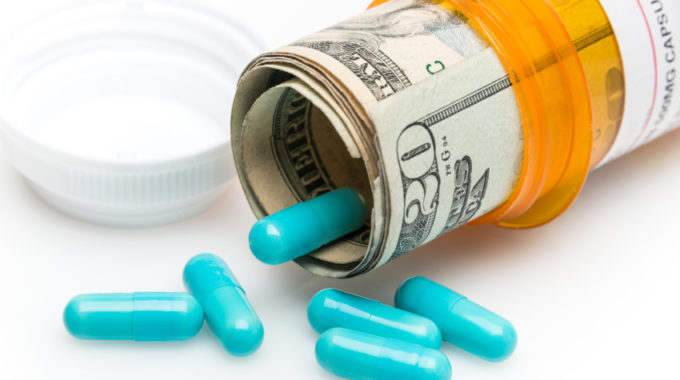Adapted from the writings of Dayan Yitzhak Grossman April 18, 2024 AP News reports: A…

Drug Bust: How High a Price Is Too High?
Adapted from the writings of Dayan Yitzhak Grossman
October 28, 2021
Ars Technica reports:
A storm is brewing over the pricing and licensing of Merck’s antiviral pill molnupiravir, which the pharmaceutical giant says can halve the risk of hospitalization and death in high-risk COVID-19 patients.
Merck’s advance purchase agreement with the US government pegs the price of a five-day treatment at about $700. But an independent analysis by public health researchers at Harvard estimated that a sustainable generic price—with a 10 percent profit margin built in—would be just $20 per treatment. Further, rival generic manufacturers in India are already expected to offer the drug at $15 or less for a treatment once it’s authorized for use.
Given that, the $700 price tag in the US represents a 46-fold markup of the drug…[1]
The enormous markup is reminiscent of Martin Shkreli’s notorious raising of the price of the antiparasitic drug Daraprim by a factor of 56; in this article, we explore some Torah perspectives on price gouging in the specific context of drug pricing.
Fair drug pricing
The Ramban asserts:
One who has medicines that his fellow who is ill requires is prohibited to raise their price more than is appropriate.[2]
This ruling is codified by the Tur and Shulchan Aruch.[3] The nature and source of this prohibition, however, and the definition of “more than is appropriate,” are unclear.[4]
Meshateh ani bach
The aforementioned authorities add that even if the ailing person commits to pay a high price for drugs out of desperation, he is only liable for their actual value. This is a corollary of a general rule that when someone purchases something for more than the market price out of desperation, his agreement to pay the inflated price is not binding, since he can claim that he was not serious in his commitment to pay that much (meshateh ani bach).
The Ritva adds that this general rule applies even if he has already paid, in which case he is entitled to a refund.[5]
The Ketzos Hachoshen objects to the Ritva’s ruling on two grounds: First, it is established halacha that one can only claim meshateh ani bach to avoid paying the inflated price, but not to demand a refund. Second, one can presumably only claim meshateh ani bach in the absence of a kinyan (an act that formalizes a transaction).[6]
Ona’ah
The main halacha governing pricing in general is the prohibition against ona’ah (overcharging or underpaying). The problem with applying this prohibition to drug pricing is that ona’ah is not calculated with respect to some sort of “fair” or “true” value, or to the seller’s cost, but rather with respect to the current local market price.[7] When a drug is only available at an exorbitant price, charging that price is by definition not ona’ah. Even if it is available in other countries at much cheaper prices, if in a particular country it is only available at an exorbitant price, the prohibition of ona’ah would still not apply.[8]
Profiteering
A halacha that is more relevant to drug pricing is the prohibition against profiteering: It is forbidden to charge arbitrarily high prices for essential foodstuffs, such as wine, oil, and flour, on which one may only make a profit of one sixth, i.e., twenty percent of his costs, including all expenses and the value of his work (making the profit 1/6 of the sale price).[9] While this rule is limited to essential foodstuffs, it could perhaps be argued that crucially important drugs, particularly lifesaving ones, are also included,[10] although a major complicating factor is that for a drug development model to be economically viable and fair to the developer, the pricing of successful drugs must take into account the unrecoverable cost of developing a multitude of failed drugs.[11]
Hafka’as she’arim
Another halacha that may be relevant to drug pricing is the prohibition against unreasonably raising prices (hafka’as she’arim).[12] It is unclear, however, what exactly this prohibition entails, and how it extends beyond the prohibitions against ona’ah and profiteering.[13]
[1]Beth Mole. Storm brews over 46x price markup of Merck’s Thor-inspired COVID pill. Ars Technica. https://arstechnica.com/science/2021/10/mercks-thor-inspired-covid-treatment-hammered-for-700-price-a-46x-markup/ .
[2]Toras Ha’adam, Sha’ar Hasakanah p. 18.
[3]Tur Y.D. siman 336; Shulchan Aruch ibid. se’if 3.
[4]R’ Yair Hoffman, The Two Million Dollar Drug Cost and Halacha, YWN, writes:
“Interestingly enough, a Chasidishe friend of this author had posed the question to Rav Elyashiv zt”l and printed it in his Sefer Vayishma Moshe (Vol. II p. 345). Rav Elyashiv answered that a person can charge a very significant amount of money for a medicine. When further questioned about it in comparison to Bil’am who showed a desire for a huge sum, Rav Elyashiv drew a distinction in that Bil’am had no basis to want such a large amount. It would seem that Rav Elyashiv’s conclusions permitting are based upon the huge time, effort, and financial investment involved. Otherwise, how could he argue on a clear law in Shulchan Aruch?”
[5]Chidushei HaRitva Kidushin 8a.
[6]Ketzos Hachoshen beginning of siman 227.
[7]See R’ Aaron Levine, Case Studies in Jewish Business Ethics, pp. 158-60.
[8]See Piskei HaRosh Kidushin perek 1 siman 17; Toldos Adam VeChavah nesiv 19 cheilek 1 p. 167a column 1 and Maysharim nesiv 9 cheilek 3 pg. 31b column 1.
[9]Shulchan Aruch C.M. 231:20 and Sma ibid.; Pis’chei Choshen, Hilchos Geneivah V’ona’ah 14:11-12. Cf. R’ Itamar Warhaftig, Consumer Protection: Price and Wage Levels, B.4.
[10]See Warhaftig ibid. C.1.
[11]See Wikipedia contributors. Drug development. In Wikipedia, The Free Encyclopedia. https://en.wikipedia.org/w/index.php?title=Drug_development&oldid=1046582485;
Wikipedia contributors. Cost of drug development. In Wikipedia, The Free Encyclopedia. https://en.wikipedia.org/w/index.php?title=Cost_of_drug_development&oldid=1032049654.
[12]Shulchan Aruch ibid. se’ipim 21 and 25.
[13]See Pis’chei Choshen ibid. n. 31 (and cf. ibid. Chapter 10 end of n. 1 p. 298).





